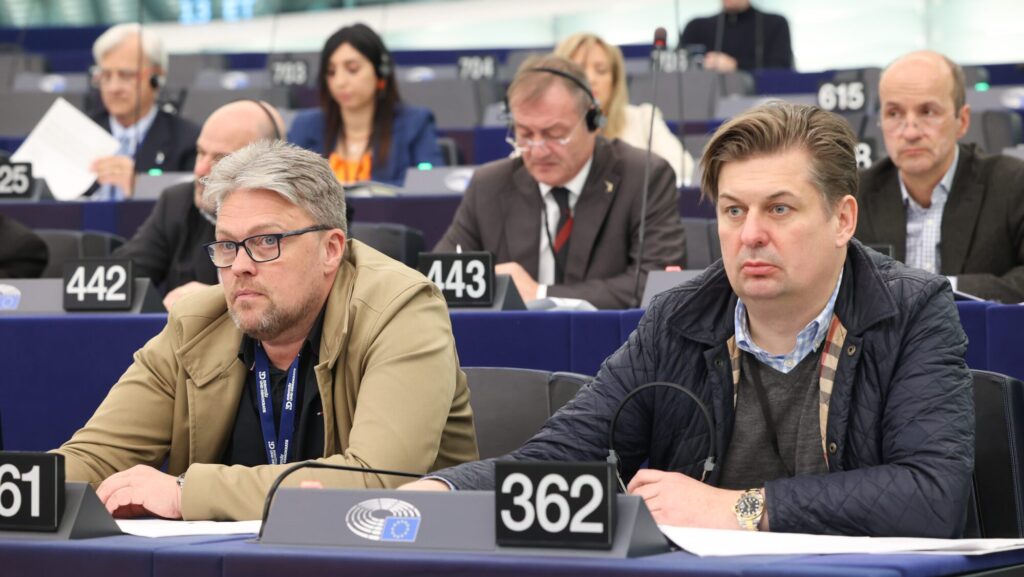
AfD MEPs Guido Reil and Maximilian Krah
Photo: Alexis HAULOT © European Union 2023 – Source : EP
A long-brewing rift between the French Rassemblement National (RN) and the Alternative für Deutschland (AfD) erupted in the final week’s before June’s European elections with news that the German populist party is to be expelled from the nationalist Identity and Democracy (ID) faction of the EU Parliament.
Comments by AfD MEP Maximilian Krah about SS soldiers was the straw that broke the camel’s back for the French-dominated ID group. A public Franco-German schism first appeared over the issue of remigration in February.
Sources with an understanding of the inner workings of the ID have seen such a break as inevitable for over a year. Divergence over Ukraine combined with a bumper crop of AfD MEPs expected after June is also anticipated to unsettle the balance of power within the nationalist ID.
Speaking anonymously to The European Conservative, one French official said that the Rassemblement National in Brussels felt that a schism had been on the cards for a while, adding that the AfD had “been piling on controversy and putting us in embarrassing situations.”
Other French aides in Brussels claimed to be particularly aggrieved by Krah’s use of ID branding in videos where he made controversial statements as a way to provoke a backlash from the RN and destabilise the group.
French considerations are also driven by national elections. Sources agree that Brussels is secondary to RN’s strategic objectives of winning a majority at home. AfD’s perceived growing radicalism over NATO and migration are seen as a liability by the reform-minded Le Pen. The Krah debacle provided a convenient pretext for RN to distance itself from AfD.
The ID group has previously suffered the loss of its Finnish contingent last year when the Finns Party defected to the more pro-NATO ECR due to the perceived Russian sympathies of the German contingent in particular.
This general sentiment among the Scandanavians was underscored by a statement by Danish MEP Anders Vistisen (Danish People’s Party) Wednesday, saying that “Krah of the AfD has shown with his statements and actions that he does not belong in the ID group.”
The Italian Lega Vlaams Belang, the Danish People’s Party (DF), and the Czech SPD were among the ID parties that supported French calls to expel the AfD during this week’s crisis meetings. Lega in particular is known for its strong relationship with the RN in Brussels.
The AfD was also noticeably absent from the VOX-organised VIVA 24 conference in Madrid last week, where a clear outline of a unified European Right was observed for the first time since the Ukrainian war.
The split with the AfD raises hopes in some Brussels circles of the beginnings of a right-wing ‘super group’—or at least alliance— comprising the more pro-Atlanticist ECR and remnants of the ID.
A potential ID-ECR alliance heading into July would have to contend with Italian PM Giorgia Meloni’s Fratelli Party likely taking up the leadership role in the ECR group due to a declining share of Polish PiS MEPs. Meloni has been adamant in her wish to placate von der Leyen’s European Commission, on whom Italy is financially dependent.
EU parliamentary groups are notoriously fickle and prone to change during election time. AfD’s exit from the ID is good news for the RN, due to the political manoeuvrability it gives them to dominate the nationalist scene in Brussels.
The question remains of what happens to AfD in the aftermath of the severing of ties with the ID.
A potential collapse of the ID over pro- and anti-war factions has been a subject much discussed behind the scenes over the past year in Brussels.
That dynamic is now breaking down with the expected arrival of new nationalist parties from Eastern Europe (Poland’s Konfederacja and Hungary’s Mi Hazánk). The potential to rally more anti-NATO parties presents a slight chance to forge a new group further to the right of the ID.
Launching such a group is not entirely impossible, given the expected makeup of the next European Parliament. A new faction requires 23 MEPs from seven member states.
The idea of forming a new right-wing group has been played around with by elements in the Dutch Forum for Democracy (FvD) and AfD. Sources tell us it has at one time been a pet project of AfD MEP Maximillian Krah with the aim to decouple from the French-dominated ID and its reformist outlook.
“[Krah] has always wanted to be a big fish in a small pond” declared one source close to AfD, adding that Krah wouldn’t oppose “a very radical group further to the right of the ID,” should he be able to lead it.
The formation of such a group is more unlikely since Krah’s fall from grace within the AfD hierarchy, and the reassertion of control by the AfD’s Berlin leadership, which wishes to take the party in a more moderate direction.
The alternative to a new group would leave AfD unaligned in the parliament, resulting in a reduction in power, resources, and international prestige. There is also the possibility that the AfD—minus Krah—could end up in ID after the election once the dust settles.
An additional wild card in the next EU Parliament could be the Czech ANO party under Andrej Babiš which, despite being aligned with the liberal Renew faction, is veering in a right-wing direction due to the impact of EU sanctions on Russia affecting Czechia negatively.
Simultaneously, the economically left, socially right Slovakian Smer party under Robert Fico is also seeking a new home after suspension from the S&D group over objections to sanctions against Russia.
